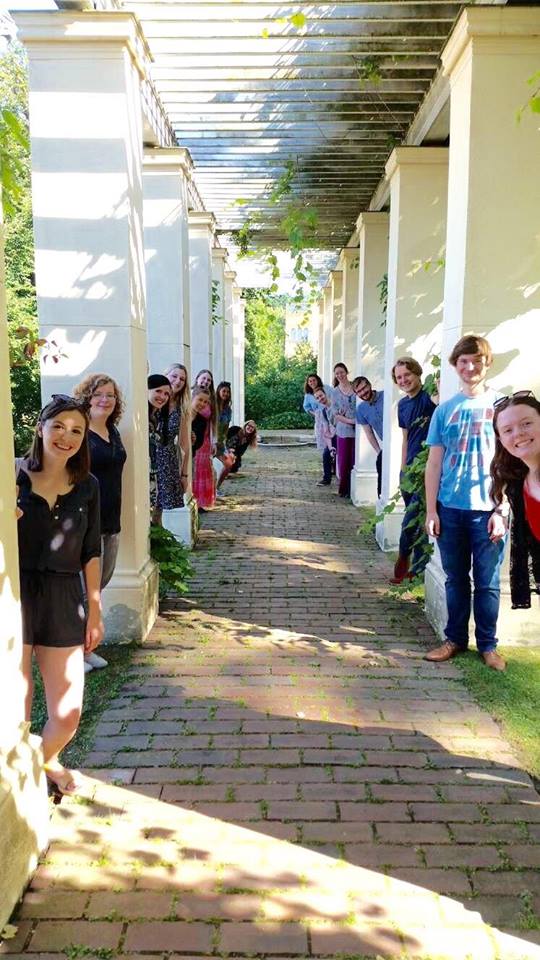September 12, 2016, by Will Leveritt
Nottingham and Berlin Classics exchange – “Q-Kolleg”
This week saw the conclusion of this round of Q-Kolleg, an international study initiative between the University of Nottingham and the Humboldt Universität zu Berlin based around the visual culture of Classical antiquity. Participants from the Department of Classics at Nottingham were partnered with students from the Winckelmann-Institut, and they engaged in a two-semester programme of mutual study parallel to their main courses, designed to benefit the participants in several different ways.

Q-Kolleg fellows recreate the West pediment of the Temple of Zeus at Olympia, in front of casts at the Winckelmann-Institut. Becky Batty, Josh Gardiner, Rachel Flaxman, Ellie Dixon, Ariane Watson, Jessica Bartz, Léa Geisler and Nina Horn-Wittkuhn, with Dr Will Leveritt centrally, arbitrating as Apollo.
Participants in the programme gain the chance to examine material they might otherwise not study, and to forge relationships and collaboration across regional boundaries. International differences in study and teaching methods often come as a surprise; Ellie Dixon, a Nottingham participant this year, observed that she was particularly intrigued by the “varying perspectives and broad range of cultural differences in the way material of the ancient world is approached”. Most importantly, the programme provides participants with the opportunity to select and pursue their own research topic, to be presented at a conference held in Berlin. It is this emphasis on students engaging in their own research, ultimately producing a paper for presentation in a formal context, that makes Q-Kolleg such an exciting and innovative programme.
Throughout the process, the fellows are guided closely in their endeavours by representatives from both institutions, and encouraged to seek advice and opinions more widely. This year the theme of the conference was Original and Copy, under which papers were produced examining such things as the influence of Egypt on archaic Greek statues, a diachronic study of the imagery of the Dioscuri, and the reception of Classical antiquity in grand 18th century houses in Germany and England. Becky Batty commented that the “rewarding international collaborations produced a very valuable learning experience, providing new perspectives on unfamiliar topics”. The conference was well attended and fellows gained invaluable experience during the process as well as feedback on their topics from world-leading experts.
During our time in Berlin participants were also able to attend masterclasses in front of ancient objects where they received training and practice in the personal autopsy of ancient artworks, as well as visit museums and sights of historical interest in the city of Berlin. In many cases (such as our examinations of Roman sarcophagi) this built on and extended prior knowledge of the participants but other sessions, such as the material about the Egyptian language and iconography, was entirely novel to the students and material they would not otherwise access. Visits to Sanssouci in Potsdam and Schloss Glienicke in Wannsee were especially timetabled to allow the fellows to explore elements of reception theory that emerged in their studies. I think I can say pretty certainly too that alongside the academic benefits, participants in Q-Kolleg 2016 had a lot of fun sampling the culture and sights of Berlin too; Rachel Flaxman added that “spending free time together made the rigorous academic parts easier to cope with”. Firm friendships seem to have been made, with plans already emerging for further visits.
No comments yet, fill out a comment to be the first



Leave a Reply